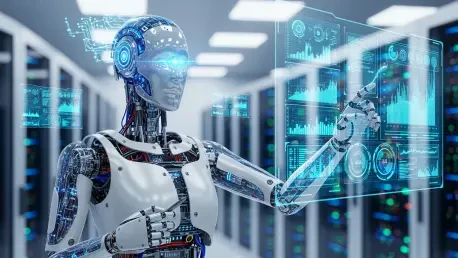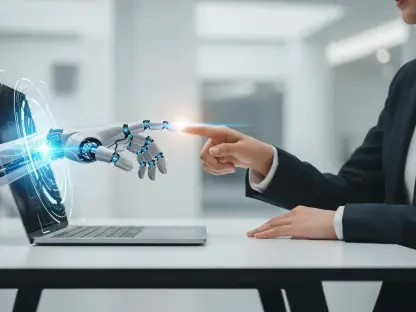As the digital landscape continues to evolve at a breakneck pace, few experts are as well-equipped to guide us through the intersection of AI and marketing as Anastasia Braitsik. A global leader in SEO, content marketing, and data analytics, Anastasia has a deep understanding of how technological shifts shape customer engagement strategies. In this interview, we dive into the transformative power of AI in marketing, exploring how it redefines daily workflows, enhances team collaboration, and personalizes customer experiences at an unprecedented scale. We also touch on the enduring principles of marketing that remain unchanged, the challenges of navigating AI’s unpredictability, and the future of 1:1 engagement through advanced decisioning tools. Join us as we unpack these critical themes with one of the industry’s sharpest minds.
How do you see the current shift with AI differing from past technological changes in marketing?
What sets AI apart from previous shifts—like the rise of social media or mobile—is its non-deterministic nature. Unlike past technologies where you could somewhat predict trajectories based on existing patterns, AI’s evolution is much harder to forecast. It’s not just about faster tools or bigger data; it’s about systems that learn and adapt in ways we can’t fully anticipate. This unpredictability forces marketers to rethink their approach, focusing on first principles rather than relying on linear projections. We’re seeing a shift from rigid planning to a mindset of constant experimentation and flexibility, which is both a challenge and an opportunity.
What makes adapting to AI’s unpredictable future such a unique hurdle for marketers?
The biggest hurdle is that we can’t just look at where AI is today and map out where it’ll be even a year from now. Its development is influenced by so many variables—new algorithms, data privacy laws, consumer reactions—that it’s almost impossible to predict with certainty. Marketers are having to build adaptability into their core strategies, creating systems for regular check-ins and pivots rather than sticking to long-term plans. It’s about staying agile, testing new tools as they emerge, and being ready to overhaul strategies when the landscape shifts unexpectedly.
What core elements of marketing do you believe will remain unchanged despite AI’s rapid influence?
At its heart, marketing will always be about understanding and meeting consumer needs. No matter how advanced AI gets, people will still crave products, services, and experiences that resonate with them on a personal level. Similarly, marketers will always strive to connect with audiences in meaningful, effective ways. Technology might change how we deliver those connections, but the fundamental goals—building trust, solving problems, and creating value—remain timeless. That human-centric focus is the anchor that keeps us grounded amidst all the tech disruption.
How is AI reshaping the day-to-day responsibilities of marketers in practical ways?
AI is taking a lot of the repetitive, time-consuming tasks off marketers’ plates. Things like drafting basic messages, scheduling content, or pulling together initial data reports are increasingly automated. This shift means less time on grunt work and more space for strategic thinking—whether that’s brainstorming bold campaign ideas or diving deeper into testing and optimization. I’ve seen teams go from spending hours on manual processes to focusing on high-impact creative decisions, which is a game-changer for productivity and job satisfaction.
In what ways is AI opening up more room for creativity within marketing teams?
By handling the rote stuff, AI frees up mental bandwidth for the kind of work that really moves the needle. Marketers can spend more time ideating innovative campaigns, exploring new ways to tell their brand’s story, or experimenting with nuanced audience segmentation. For instance, instead of manually tweaking email copy for hours, a marketer can use AI to generate drafts and then focus on refining the emotional tone or crafting a unique hook. It’s about amplifying human creativity rather than replacing it, letting us tackle bigger, more imaginative challenges.
How do you see AI influencing collaboration within marketing teams over the coming years?
AI is becoming almost like a direct teammate. It’s not just a tool; it’s a collaborator that can take on specific roles within a campaign. Imagine a setup where AI agents handle tasks like personalizing product recommendations or quality-checking messages while human marketers focus on strategy and oversight. Even junior team members can act as managers of these AI agents, gaining valuable leadership experience early on. This dynamic creates a hybrid team structure where humans and AI complement each other, driving efficiency and innovation together.
What role does the idea of ‘digital institutional memory’ play in how AI supports marketing teams?
Digital institutional memory is about preserving a team’s knowledge and context over time through AI. As agents are trained on a brand’s voice, goals, and past campaigns, they become repositories of that information, ensuring continuity even when human team members leave or priorities shift. This is huge for maintaining consistency and avoiding the loss of insights during transitions. It means new team members can hit the ground running, and the brand’s strategic learnings aren’t lost to turnover or time—it’s like having a living archive that actively supports ongoing work.
How is AI decisioning revolutionizing the way brands engage with their customers?
AI decisioning is finally making true 1:1 personalization a reality. Before this, even the best teams struggled to go beyond micro-segmentation due to tech limitations. Now, with AI leveraging reinforcement learning, brands can tailor every interaction—down to the product offer, channel, timing, and message—for each individual customer. It’s not just about predicting behavior; it’s about continuously experimenting and adapting in real time to what consumers respond to. This level of relevance transforms customer experiences, making them feel seen and understood in ways that weren’t possible before.
What are some standout benefits of AI decisioning when it comes to delivering personalized experiences?
The biggest benefit is relevance at scale. AI decisioning uses first-party data to understand individual preferences and behaviors, then optimizes every touchpoint to maximize outcomes like conversions or loyalty. It’s not static—it’s constantly learning from consumer responses, so if preferences shift, the system adjusts instantly. For customers, this means getting offers or messages that feel uniquely tailored to them, not just a generic segment. For brands, it’s a massive boost in engagement and efficiency, as they’re not wasting resources on one-size-fits-all approaches.
What is your forecast for the role of AI in customer engagement over the next few years?
I believe AI will become even more integral to customer engagement, moving beyond a supportive tool to a core driver of strategy. We’ll see deeper integration of AI decisioning across all touchpoints, with systems that not only personalize but also anticipate customer needs before they’re even expressed. The focus will shift toward building robust infrastructures to support these AI capabilities, ensuring real-time action and seamless experiences. Brands that invest in agility and strong foundational tech now will lead the pack, while those who treat AI as a quick fix will struggle to keep up with increasingly sophisticated consumer expectations.









